Related Research Articles
The Ulster Political Research Group is an advisory body connected to the Ulster Defence Association (UDA), providing advice to them on political matters. The group was permanently founded in January 2002, and is largely a successor to the Ulster Democratic Party.

Andrew Samuel Duddy, known as Sammy, was a Northern Irish loyalist, having joined the Ulster Defence Association (UDA) shortly after its formation in 1971. He later became a leading member of the Ulster Political Research Group (UPRG), which provided political advice to that organisation.

The Ulster Workers' Council (UWC) strike was a general strike that took place in Northern Ireland between 15 May and 28 May 1974, during "the Troubles". The strike was called by unionists who were against the Sunningdale Agreement, which had been signed in December 1973. Specifically, the strikers opposed the sharing of political power with Irish nationalists, and the proposed role for the Republic of Ireland's government in running Northern Ireland.
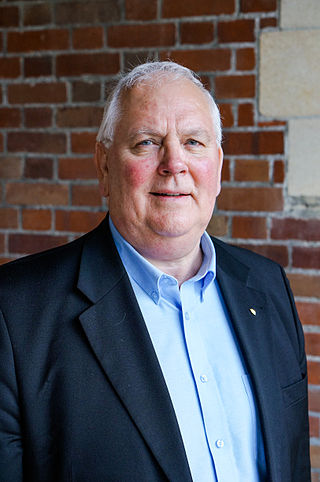
Albert Glenn Barr OBE was a politician from Derry, Northern Ireland, who was an advocate of Ulster nationalism. For a time during the 1970s he straddled both Unionism and Loyalism due to simultaneously holding important positions in the Vanguard Unionist Progressive Party and the Ulster Defence Association.
The Ulster Loyalist Central Co-ordinating Committee (ULCCC) was set up in 1974 in Belfast, Northern Ireland in the aftermath of the Ulster Workers Council Strike, to facilitate meetings and policy coordination between the Ulster Workers Council, loyalist paramilitary groups, and the political representatives of Ulster loyalism.
Raymond "Ray" Smallwoods was a Northern Ireland politician and sometime leader of the Ulster Democratic Party. A leading member of John McMichael's South Belfast Brigade of the Ulster Defence Association (UDA), Smallwoods later served as a leading adviser to the UDA's Inner Council. He was killed by the Provisional Irish Republican Army (IRA) outside his Lisburn home.

The Loyalist Association of Workers (LAW) was a militant unionist organisation in Northern Ireland that sought to mobilise trade union members in support of the loyalist cause. It became notorious for a one-day strike in 1973 that ended in widespread violence.
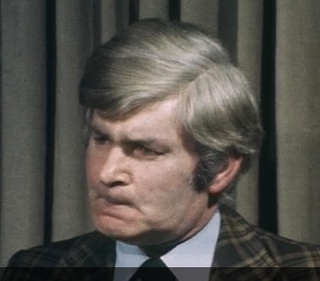
John Dunlop McKeague was a Northern Irish loyalist and one of the founding members of the paramilitary group the Red Hand Commando in 1970. A number of authors on the Troubles in Northern Ireland have accused McKeague, a homosexual paederast, of involvement in the Kincora Boys' Home scandal but he was never convicted. He was shot dead by the Irish National Liberation Army (INLA) in Belfast in January 1982.

John "Jackie" McDonald is a Northern Irish loyalist and the incumbent Ulster Defence Association (UDA) brigadier for South Belfast, having been promoted to the rank by former UDA commander Andy Tyrie in 1988, following John McMichael's killing by the Provisional IRA in December 1987. He is also a member of the organisation's Inner Council and the spokesman for the Ulster Political Research Group (UPRG), the UDA's political advisory body.
William Hull was a loyalist activist in Northern Ireland. Hull was a leading figure in political, paramilitary and trade union circles during the early years of the Troubles. He is most remembered for being the leader of the Loyalist Association of Workers, a loyalist trade union-styled movement that briefly enjoyed a mass membership before fading.
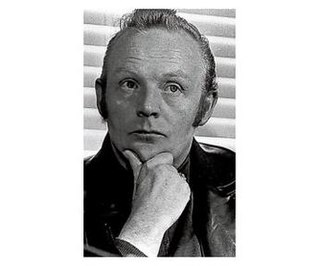
Tommy Herron was a Northern Ireland loyalist and a leading member of the Ulster Defence Association (UDA) until his death in a fatal shooting. Herron controlled the UDA in East Belfast, one of its two earliest strongholds. From 1972, he was the organisation's vice-chairman and most prominent spokesperson, and was the first person to receive a salary from the UDA.
Andrew Tyrie is a Northern Irish loyalist paramilitary leader who served as commander of the Ulster Defence Association (UDA) during much of its early history. He took the place of Tommy Herron in 1973 when the latter was killed, and led the organisation until March 1988 when an attempt on his life forced him to resign from his command.
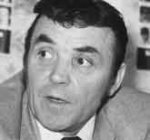
Tommy "Tucker" Lyttle, was a high-ranking Ulster loyalist during the period of religious-political conflict in Northern Ireland known as "the Troubles". A member of the Ulster Defence Association (UDA) – the largest loyalist paramilitary organisation in Northern Ireland – he first held the rank of lieutenant colonel and later was made a brigadier. He served as the UDA's spokesman as well as the leader of the organisation's West Belfast Brigade from 1975 until his arrest and imprisonment in 1990. According to journalists Henry McDonald and Brian Rowan, and the Pat Finucane Centre, he became a Royal Ulster Constabulary (RUC) Special Branch informer.

William Mitchell was a Northern Ireland loyalist, community activist and member of the Progressive Unionist Party. Mitchell was a leading member of the loyalist Ulster Volunteer Force (UVF) and served a life sentence for his part in a double murder. He later abandoned his UVF membership and took up cross-community work.
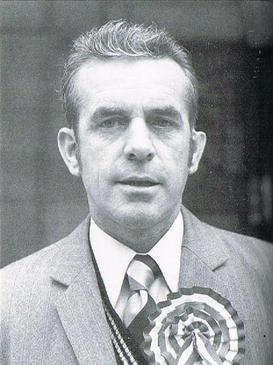
Kenneth Gibson was a Northern Irish politician who was the Chairman of the Volunteer Political Party (VPP), which he had helped to form in 1974. He also served as a spokesman and Chief of Staff of the loyalist paramilitary organisation, the Ulster Volunteer Force (UVF).
William Elliot was a former Northern Irish loyalist who served as brigadier of the Ulster Defence Association's (UDA) East Belfast Brigade in the 1980s.
Samuel Smyth was a Northern Irish loyalist activist. A founder member of the Ulster Defence Association (UDA) he was the early public face of the movement as the organisation's spokesman, and he later became involved in the group's attempts to politicise. He was assassinated by the Provisional IRA as part of the Troubles. Author Steve Bruce described Smyth as the "sometime editor of the Ulster Militant and a loose cannon who enjoyed an exciting and erratic relationship with the UDA".
The Orange Volunteers (OV) was a loyalist vigilante group with a paramilitary structure active in Northern Ireland during the early 1970s. It took its name from the Orange Order, from which it drew the bulk of its membership.
The Ulster Volunteer Service Corps (UVSC) was an Ulster loyalist vigilante and paramilitary movement active in Northern Ireland during the early 1970s. Initially the steward group for the Ulster Vanguard, under the title Vanguard Service Corps, it continued to exist after becoming independent of that movement.
Andrew Robinson is a Northern Irish former loyalist paramilitary leader. Robinson held the rank of "Brigadier" in the Ulster Defence Association (UDA) and was leader of the organisation's North Antrim and Londonderry Brigade as well as a member of the UDA's Inner Council.
References
- ↑ Wood, p. 33
- ↑ Wood, p. 32
- ↑ Wood, pp. 33–34
- ↑ Wood, p. 34
- ↑ McDonald & Cusack, p. 75
- ↑ Wood, pp. 34–35
- ↑ Wood, pp. 35–36
- ↑ Wood, p. 50
- ↑ McDonald & Cusack, pp. 82–83
- ↑ Bowyer Bell, p. 411
- ↑ Bowyer Bell, p. 410
- ↑ McDonald & Cusack, pp. 89–90
- ↑ Wood, pp. 52–53
- ↑ Flackes & Elliott, p. 347
- 1 2 Flackes & Elliott, p. 345
- ↑ McDonald & Cusack, pp. 101–102
- 1 2 McDonald & Cusack, p. 102
- ↑ Wood, p. 53
